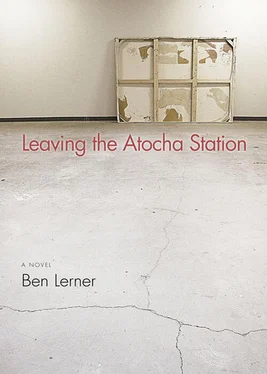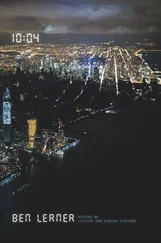I wondered how my project would have differed if I’d come to Barcelona instead of Madrid. I thought of this in order to avoid thinking about Teresa, wherever she was. That I was contingent, interchangeable, I took as a given. Slightly more impetuous brushstrokes in the self-portrait, also 1896. A shameless celebration of his own lips. The left eye, however, blackened by shadow, looked like it was blackened by a fist. I tried to imagine myself at fifteen. I remembered my brother teaching me to drive in the parking lot of the V.A.
Only the juvenilia interested me. I walked indifferently through the rose rooms and blue rooms and nodded to the guards; I brought them greetings from the museum guards of Madrid. If Teresa were there, I would have asked her: what painting would you most like to stand in front of hour after hour, day after day? It wasn’t the same question as what is your favorite painting. Or what period would you most like to dwell in and protect. Would you prefer to have to see, month after month, the figurative or the abstract? I remembered learning to drive and bonfires at Lake Clinton and what they called “experimenting” with alcohol and drugs. A tentative procedure; an act or operation for the purpose of discovering something unknown or of testing a principle or supposition. Now I was an experimental writer.
My mom, whenever we went to a museum, told me that painting seemed to have developed in reverse; that if an alien were to arrive at a museum, the alien would think the abstract canvases came first, hundreds if not thousands of years before the Renaissance. Unless the alien happened to look like a yellow triangle abutting a plane of blue. I always dismissed this theory in my mother’s presence, but if Teresa were with me, I would have offered it as my own. You could say it about Picasso’s particular development and it would sound intelligent, right or wrong. In the gallery devoted to Picasso’s relation to African art, there were two young kids, six or seven. I didn’t see the rest of the family. One walked up quickly to a large canvas and pawed it, clearly on a dare. Both kids ran out of the gallery, presumably back to their parents. There was no guard around. I approached the canvas the child had touched, a miniature precursor of, or study for, Les Demoiselles d’Avignon. I double-checked no one was around and, since the world was ending, touched the painting myself.
While I was attempting to hail a cab back to El Barrio Gótico, the rain intensified. I tried to reenter the museum, but couldn’t find my ticket, and the guard refused to let me pass. I crossed the street and ducked into a video-game arcade that had a few of the electronic gambling machines old men were always playing; such arcades were everywhere in Spain, but I’d never been inside one. I walked to the end of the arcade, past various flashing lights and blaring soundtracks and one or two kids, until I arrived at a car-shaped game in which I could sit down. I was dripping. I leaned my head against the wheel and felt the full force of my shame. I wasn’t capable of fetching coffee in this country, let alone understanding its civil war. I hadn’t even seen the Alhambra. I was a violent, bipolar, compulsive liar. I was a real American. I was never going to flatten space or shatter it. I hadn’t seen The Passenger, a movie in which I starred. I was a pothead, maybe an alcoholic. When history came alive, I was sleeping in the Ritz. A blonde woman, if that’s the word, with exaggerated breasts and exaggerated eyes, was waving a checkered flag on the screen before me. I dare you to play again, she said in English.
I left the arcade. It had stopped raining. I hailed a cab to El Barrio Gótico. When the cabdriver attempted to make small talk, I said in Spanish that I didn’t speak Spanish. He said one or two things to me in English and, when I didn’t respond, French. When we arrived at the neighborhood’s edge, I overpaid him and resumed my search. After a few minutes, I thought I saw the first café, the one I’d entered upon leaving Teresa. I went down every street radiating out from the café but could not locate the hotel. It had been how many hours? I was beginning to find it a little difficult to breathe, the prodrome of panic. I asked an elderly man what time it was; it was six or seven something, alarmingly late. I entered what might have been the same café where I’d eaten the tortilla, all the cafés were by this point interchangeable, ordered sparkling water and tried to relax. I felt like the right thing to do should have been obvious. I felt another Isabel-related pang. I longed for the Alhambra and cursed the spidery Sagrada Familia. I ordered a real drink and considered calling my parents, asking their advice, and felt embarrassed; I considered getting a hotel room, going to sleep, figuring everything out tomorrow. By the third drink, I was considering leaving not only Barcelona, but Spain altogether, and never seeing Teresa again. Were the links that tenuous?
When night was imminent the panic was upon me, a thin layer of cold foil under my skin. I took a tranquilizer. I left the café and began to walk the neighborhood again. Within three minutes of leaving the café I found myself before what was unmistakably our hotel. Only when illuminated by streetlights did I recognize the façade. My first reaction was fury, not relief; fury that it had been here all along. My fury dissipated into worry about what I would tell Teresa. The panic, at least, was gone, replaced with an almost painful sobriety. I wondered if Teresa was still there and entered the hotel to find out. The woman behind the desk looked at me significantly and picked up the phone. I ran up the stairs and knocked on the door and Teresa opened it. She turned immediately back into the room and I followed her. Her little bag was packed and on the bed.
“I have been lost all day,” I said. It sounded like a lie.
“Why didn’t you call me?” she asked. She was disconcertingly calm.
“I don’t have your phone number,” I said.
“I have given you my number many times,” she said, which was true.
“I don’t have it. I’m sorry. I have spent twelve hours walking around this neighborhood,” I said, feeling the exhaustion.
“You walked around the neighborhood all day,” she asked, as if she knew everywhere I’d been.
“And I walked down Las Ramblas to the water and I went to the Picasso museum. I thought that maybe you were there,” I said.
“You went to the beach and you went to a museum,” she confirmed. It did sound outrageous.
“I went to the beach to think before looking for the hotel again.” I couldn’t remember the Spanish expressions for “clear my head” or “gather my thoughts.” “And I went to the museum because I thought you were maybe there.” It didn’t sound right. Of course she wouldn’t have gone to the museum. “I’m sorry,” I said. I wanted to defend myself but my Spanish was crumbling. Somehow switching to English would mean conceding everything.
“I have to go back to Madrid,” she said flatly.
“Why?” was all I could manage.
“I’m needed at the gallery,” she said. “The night train leaves in an hour or so. We should go to the station soon.”
I blinked at her. “I’m not going back yet,” I said to our mutual surprise.
She looked at me directly for the first time since I’d returned. “Why?”
“I might not be in Barcelona again and there is a poet here I want to see,” I lied. I did not want to stay without her, but I felt it would be humiliating to return with her now like a shamed child.
She stared at me. “O.K.,” she said eventually, making herself smile. “The hotel is paid for through tomorrow at five. I’ll see you in Madrid.” She kissed me quickly on both cheeks and left. She always left a room like someone who would be right back.
Читать дальше












